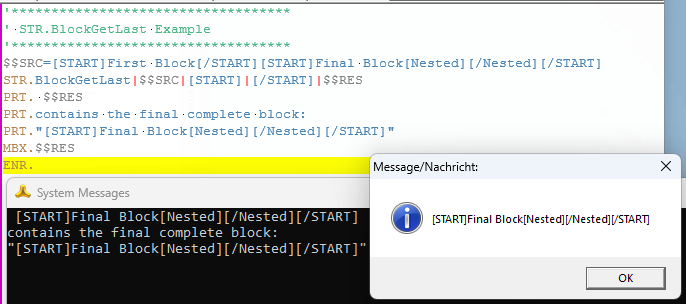MiniRobotLanguage (MRL)
BLO.BlockGetLast
Gets the last complete top-level block.

Intention
This command identifies the final complete block in a string, using start/end delimiters while respecting nested structures. It locates the last unmatched opening delimiter and its corresponding closing delimiter.
Essential for processing log files, configuration sections, or multi-block documents where final elements matter most.
Syntax
BLO.BlockGetLast|P1|P2|P3|P4
Parameter Explanation
•P1 - (Input, Text) Source string containing blocks
•P2 - (Input, Text) Opening delimiter marker
•P3 - (Input, Text) Closing delimiter marker
•P4 - (Output, Text) Variable storing last complete block
Identifying Final Top-Level Block
┌────────────────────────┐
│ │
▼ ▼
Source String: [ITEM] First Block [/ITEM][ITEM] Last Block With[Nested][/Nested][/ITEM]
Start Delimiter: └────────────────────────┘ │
End Delimiter matched, ignoring earlier blocks: └───────────────────────────────────────┘
Result: "[ITEM] Last Block With[Nested][/Nested][/ITEM]"
Example
'***********************************
' BLO.BlockGetLast Example
'***********************************
$$SRC=[START]First Block[/START][START]Final Block[Nested][/Nested][/START]
BLO.BlockGetLast|$$SRC|[START]|[/START]|$$RES
PRT. $$RES
PRT.contains the final complete block:
PRT."[START]Final Block[Nested][/Nested][/START]"
MBX.$$RES
ENR.
Remarks
• Returns empty string if no valid block exists
See also:
• BLO.BlockGetLastEx - Extended block information
• BLO.BlockGetNth - Gets specific block by index